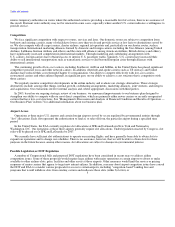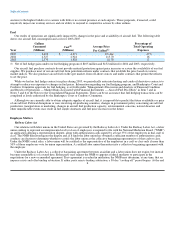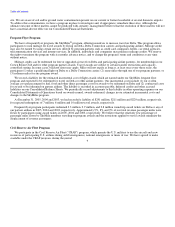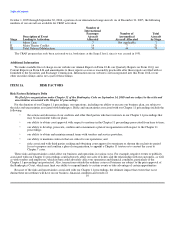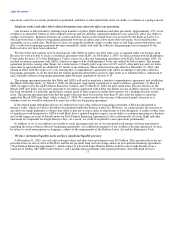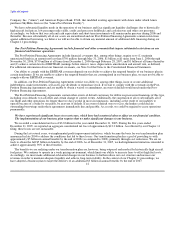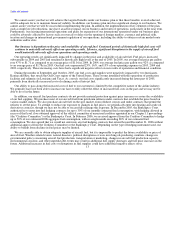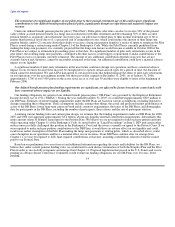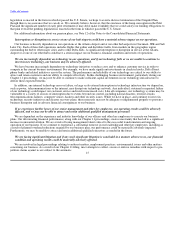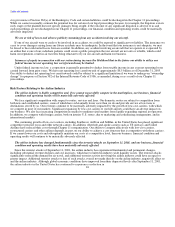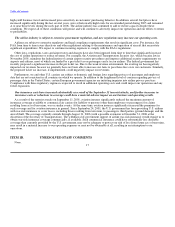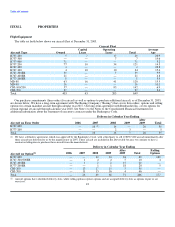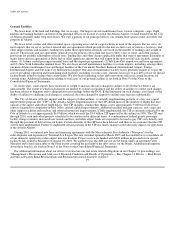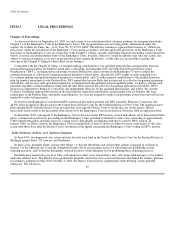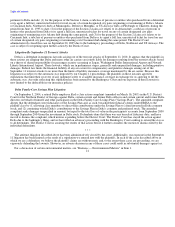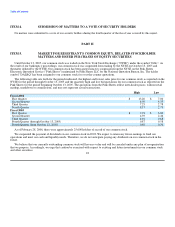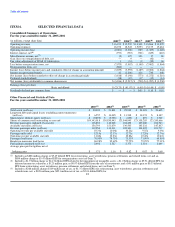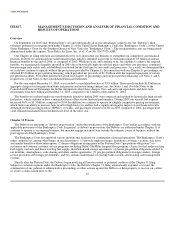Delta Airlines 2005 Annual Report Download - page 20
Download and view the complete annual report
Please find page 20 of the 2005 Delta Airlines annual report below. You can navigate through the pages in the report by either clicking on the pages listed below, or by using the keyword search tool below to find specific information within the annual report.
Table of Contents
legislation is enacted in the form in which it passed the U.S. Senate, we hope to avoid a distress termination of the Nonpilot Plan,
though there is no assurance that we can do so. We currently believe, however, that the existence of the lump sum option in the Pilot
Plan and the significant number of early pilot retirements it may drive make it unlikely that we could satisfy our funding obligations to
that plan even if the pending legislation is enacted in the form in which it passed the U.S. Senate.
For additional information about our pension plans, see Note 12 of the Notes to the Consolidated Financial Statements.
Interruptions or disruptions in service at one of our hub airports could have a material adverse impact on our operations.
Our business is heavily dependent on our operations at the Atlanta Airport and at our other hub airports in Cincinnati, JFK and Salt
Lake City. Each of these hub operations includes flights that gather and distribute traffic from markets in the geographic region
surrounding the hub to other major cities and to other Delta hubs. A significant interruption or disruption in service at the Atlanta
Airport or at one of our other hubs could have a serious impact on our business, financial condition and results of operations.
We are increasingly dependent on technology in our operations, and if our technology fails or we are unable to continue to
invest in new technology, our business may be adversely affected.
We have become increasingly dependent on technology initiatives to reduce costs and to enhance customer service in order to
compete in the current business environment. For example, we have made significant investments in check-in kiosks, Delta Direct
phone banks and related initiatives across the system. The performance and reliability of our technology are critical to our ability to
attract and retain customers and our ability to compete effectively. In this challenging business environment, particularly during our
Chapter 11 proceedings, we may not be able to continue to make sufficient capital investments in our technology infrastructure to
deliver these expected benefits.
In addition, any internal technology error or failure, or large scale external interruption in technology infrastructure we depend on,
such as power, telecommunications or the internet, may disrupt our technology network. Any individual, sustained or repeated failure
of our technology could impact our customer service and result in increased costs. Like all companies, our technology systems may be
vulnerable to a variety of sources of interruption due to events beyond our control, including natural disasters, terrorist attacks,
telecommunications failures, computer viruses, hackers and other security issues. While we have in place, and continue to invest in,
technology security initiatives and disaster recovery plans, these measures may not be adequate or implemented properly to prevent a
business disruption and its adverse financial consequences to our business.
If we experience further losses of our senior management and other key employees, our operating results could be adversely
affected, and we may not be able to attract and retain additional qualified management personnel.
We are dependent on the experience and industry knowledge of our officers and other key employees to execute our business
plans. Our deteriorating financial performance, along with our Chapter 11 proceedings, creates uncertainty that has led to a significant
increase in unwanted attrition. We are at risk of losing management talent critical to the successful transformation and ongoing
operation of our business. If we continue to experience a substantial turnover in our leadership and other key employees, including as
a result of planned overhead reductions required by our business plan, our performance could be materially adversely impacted.
Furthermore, we may be unable to attract and retain additional qualified executives as needed in the future.
We are facing significant litigation and if any such significant litigation is concluded in a manner adverse to us, our financial
condition and operating results could be materially adversely affected.
We are involved in legal proceedings relating to antitrust matters, employment practices, environmental issues and other matters
concerning our business. As a result of our Chapter 11 filing, most attempts to collect, secure or enforce remedies with respect to pre-
petition claims against us are subject to the automatic 15


